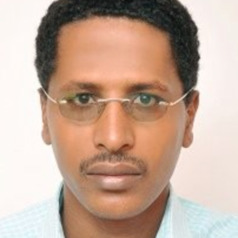
Emiru Birhane
Professor in Ecology, Mekelle University
I am a professor in restoration ecology at the department of Land resource management and environmental protection, Mekelle University. I have a PhD in Forest Ecology and Management from Wageningen University in The Netherlands; MSc degree in Farm Forestry from Swedish University of Agricultural Sciences, Sweden; and Bsc degree in forest science from Alemaya University of Agriculture, Ethiopia. I have an extensive academic and practical knowledge in forestry, ecology and management and soil quality among numerous other related fields.I used to lecture different courses in Mekelle University to Bsc. MSc. and PhD students at lecturer, assistant professor, associate professor and professor level in the areas of ecology, mycorrhizal ecology, forestry, natural resources, Ecological methods, research methods, scientific methods and other related courses for the last 20+ years. I thought PhD courses such as dryland ecology and restoration, advanced statistical methods (Ecological methods), advanced soil microbiology and scientific research writing. Msc level courses include forest ecology and management, statistical methods, environmental science, biodiversity and ecosystem functions, research methods and Agroforestry. I have also thought courses in ecology, agroforestry, forestry, biodiversity and dryland resource management at Bsc level.
I have more than 20 years of experience with research in rural areas in developing countries and has done research in Ethiopia, East Africa, Europe and Asia since 2001. This includes establishment of research lab in soil ecology and dry forest permanent plots in restored areas and remnant dry Afromontane forests. I founded the Soil ecology lab in 2015, a lab that validates mycorrhizal ecology and scale up local knowledge for sustainable development in Africa.I have long experience with field experiments and has strong skills in ecological methods and ecological impact analysis. I am recognized as a leading expert on restoration issues in Ethiopia, on which I have published more scientific papers than any other researcher has compared to the research facilities and available funds.
I have published more than 120articles in peer reviewed reputable journals, 4 books, 20 book chapters, conducted more than 36 consultancy and community service, participated in more than 60 different conferences and seminars. I have advised more than 79 Msc. students and advising and co-advising more than 28 PhD students. I won and coordinated 22 Research projects in the area of Ecology, forest science and restoration. I have been the PI and coordinator of 4 internationally funded projects (Sustainable forest management, Tree youth right, Tree for food security II, CIRCLE), several nationally funded projects and a consortium member to several projects. I was a post-doc researcher at the Norwegian University of Life Sciences (NMBU), Norway from February 2015-February 2018. I have also completed another Post-doc research for the open society project-ACCAI-IIB (May 2018-September 2018). I was active in several community service activities and consultancy services.I worked as a national and international consultant/expert for CGIAR (ICRAF, ILRI, CIFOR), international organizations (UNDP, GIZ, UNIDO, FAO) and different sectors in Ethiopia such as the Ministry of Agriculture, Commission of environment, forest and climate change, Ministry of science and higher education, Forest and environment research institute, Ethiopian institute of agricultural research and others related to agriculture and natural resource in Ethiopia. I worked as a restoration consultant for the Bee research in Saudi Arabia. I have a vast experience in capacity building, risk assessment and management, and project design and implementation in the field of Ecology and Restorations of degraded lands. I served as a consultant in Forest Management for UNDP, Ethiopia.I am known to develop and review curriculum for different universities in Africa. I am also good in networking and linking national and international stakeholders working on landscape restoration and ecosystem services. I used to involve in disseminating research outputs to local communities in collaboration with sector offices. I prepared different manuals, policy briefs and consultancy reports in the area of forestry and natural resources.
My strong and significant involvement in different research, publication and project activities enabled me to serve as an editor in chief, editor and reviewer to different disciplinary, multidisciplinary and professional based journals. I used to assume different administrative positions related to academic and research. I served as a director of the institute of climate and society, editor in chief of the journal of the drylands, head of research and community service of the college of agriculture and natural resources, coordinator of the academic complaint handling committee, chair of staff of promotion at Mekelle University, and practical attachment coordinator at Mekelle University
I am a member and chair of different professional societies. I am elected as a president of the Tigray university scholars association (TUSA) recently. I am a president of the forest society of Ethiopia Tigray branch. I am member of AFRINOM (African network on mycorrhiza), Ethiopian Forestry society, Society for conservation Biology (SCB), Association for Tropical Biology Conservation (ATBC), African Forest Forum (AFF), Society for Applied microbiology (SFAM), Forest Ecology Group and Ethiopian flora network.
I have been active in social Medias and mainstream Medias to convey academic, research and community service activities
Less ![]()
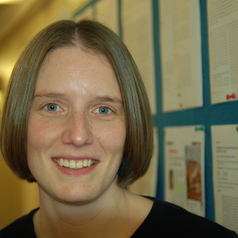
Emma Boyland
Dr Emma Boyland is a Lecturer in Appetite and Obesity at the University of Liverpool. Her PhD research examined food promotion to children in the UK and its effects on their eating behaviours. Her specific research expertise lies in quantifying the extent and nature of food advertising via television, new media and other sources (e.g. supermarket and point of sale promotions) and elucidating the impact of branding activity (e.g. use of promotional characters), and both situational factors (e.g. hunger state), and intrinsic factors (e.g. tendency to eat in the absence of hunger, cue responsiveness) on children’s food preference and intake responses to food marketing.
She has published 25 experimental papers, 11 review articles, and 6 book chapters to date, as well as over 30 published conference abstracts. She is a member of the Scientific and Technical Advisory Network for World Obesity and is a Trustee of the UK Association for the Study of Obesity.
Less ![]()
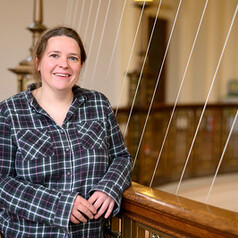
Emma Breeze
Assistant Professor International Criminal Law, University of Birmingham
Dr Breeze is a lecturer in international criminal law at the University of Birmingham. Prior to this lectureship she was a lecturer in law at Coventry University. She completed her PhD at the University of Birmingham under the supervision of Professor Robert Cryer and Dr Alexander Orakhelashvili in June 2020. She has previously held an ESRC Impact Acceleration Post-Doctoral Fellowship to develop impact from her PhD. This resulted in a policy briefing concerning the three-fold increase in the use of drones (unmanned aerial vehicles) by law enforcement in England and Wales. She has worked with several interdisciplinary research groups, including the Institute for Global Innovation and the Centre for Crime Justice and Policing, and engaged with both academics and practitioners. Her work has featured in the Journal of Conflict and Security Law.
Less ![]()
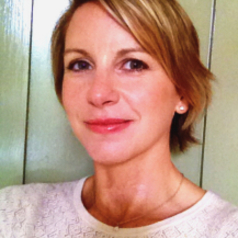
Emma Cohen
Associate Professor at the Institute of Cognitive and Evolutionary Anthropology and Fellow in Human Sciences at Wadham College, University of Oxford
I am Associate Professor at the Institute of Cognitive and Evolutionary Anthropology, University of Oxford and Fellow in Human Sciences, Wadham College.
My current primary research explores psychological links between collective movement and exercise, social bonding, cooperation and wellbeing.
Since completing my PhD in Anthropology (Queen’s University Belfast, 2005) I have held positions at the Institute of Cognition and Culture (Queen’s), the Centre for Anthropology and Mind and the Institute of Cognitive and Evolutionary Anthropology (Oxford), and the Research Group in Comparative Cognitive Anthropology at the Max Planck Institute for Evolutionary Anthropology (Leipzig, Germany) and the Max Planck Institute for Psycholinguistics (Nijmegen, Netherlands).
Less ![]()
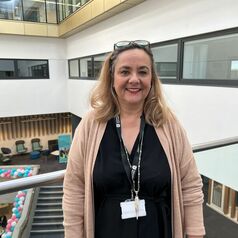
Emma Cunningham
Senior Lecturer Criminology, University of East London
I am thoroughly enjoying my work at the fabulously diverse University of East London. As a working class academic I have adopted an intersectional feminist approach to my research, teaching, and engagement which tackles some of the most urgent problems across policing. I am interested in how police culture remains toxic, how stop and search impacts community relations and how policewomen continue to undertake their role and responsibilities, remain resilient and stay in policing even given their own lived-experiences. At its heart, my scholarly activities are driven by a pursuit of equality, diversity and social justice and my work has made important contributions to our understanding of the history of women’s integration in policing and the arguments of sameness and difference which were used and applied to women, contributing to a deeper understanding of the challenges women in policing face and have faced. I have been asked by different media outlets for my expert comments for articles in The Guardian and INEWS, and I have made appearances on T.V programmes such as BBC NEWS Channel, Sky News, Channel 5 News and on the radio for 5 Live, BBC Wales and BBC Hertfordshire and Worcester. In working for UEL I have become involved in networks, blogs, and in writing short articles for the Sunday Times and Open Access Government articles about policing, misogyny and the toxic culture recently exposed in policing. I am asking questions about participation, in/exclusion, and using creative methods and approaches to present a more nuanced and complicated picture of policing problems.
Less ![]()
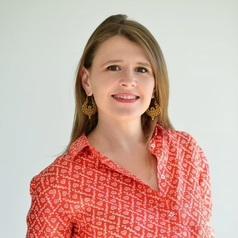
Emma Dupuy
Postdoctoral researcher, cognitive neuroscience, Université de Montréal
Researcher in cognitive neuroscience, my work focuses on brain plasticity in adults and its behavioral expression within cognitive and motor functioning. In a postdoctoral position, I address the phenomenon in older adults by investigating the neurocognitive and functional changes induced by lifestyle interventions, i.e., physical activity, cognitive training, and more recently cultural activities (museum visits).
Less ![]()

Emma Fingler
PhD Candidate in Political Studies, Queen's University, Ontario
Emma Fingler (she/her) is a SSHRC-funded doctoral candidate of Political Studies at Queen’s University researching gender, disaster response operations, and regional governance in South and Southeast Asia. She is a Doctoral Fellow with the Research Network on Women, Peace and Security (RN-WPS) at McGill University and is a Graduate Research Fellow with the Centre for International and Defence Policy (CIDP) at Queen’s University. Emma is also a Teaching Fellow at Queen’s University. Prior to joining Queen’s, she was the Special Assistant to the United Nations Resident Coordinator in Kathmandu Nepal. She holds an M.A. in Global Governance from the University of Waterloo’s Balsillie School of International Affairs and a B.A. Hons. in Political Studies from Bishop’s University.
Less ![]()

Emma Frost
PhD candidate, Australian Centre for Health Engagement, Evidence and Values, University of Wollongong
Emma is a PhD Candidate working on public engagement in healthcare AI at the Australian Centre for Health Engagement, Evidence and Values.
Less ![]()

Emma Garlett
Legal Academic and Industry Fellow, Centre for Social Responsibility in Mining, The University of Queensland
Emma Garlett is a Nyungar-Nyiyaparli-Yamatji Traditional Owner from Geraldton. Emma has experience working in the mining industry, academia, media and as a lawyer.
Emma is an Industry Fellow at the Sustainable Minerals Institute at The University of Queensland. She conducts legal and policy research to guide the future of sustainable mining, application of ESG principles, and green investment in natural resource management. She has a special interest in Traditional Owner inclusion in mining as it relates to the application of ESG principles. She has presented her legal research to the United Nations Special Rapporteur on the Rights of Indigenous Peoples, and various international (UCLA, University of Arizona) and domestic conferences (ANU, NELA, EDO).
Emma is an Adjunct Professor, Global and Engagement and Advisory Board Member of the National Centre for Reconciliation, Truth and Justice at Federation University. She also has a casual appointment at Curtin Law School.
Emma is a regular First Nations legal and business social commentator, and writes weekly columns in print and online for The West Australian. She is the host of Paint it Blak on YouTube, a partnership project between Seven West Media and Google.
Emma was appointed to and sits on both the Law Society of Western Australia’s Commercial Law Committee and Indigenous Legal Issues Committee. She is also a Tribunal Member of the West Australian Football Commission.
Less ![]()
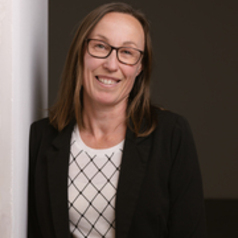
Emma Heffernan
Associate Professor in Architecture, University of Sydney
Dr Emma Heffernan is an Associate Professor in Architecture in the School of Architecture, Design & Planning at The University of Sydney. Emma is a UK Registered Architect with over a decade of experience in architectural practice in the UK. Emma has strengths in leadership in Teaching and Learning, and a developing portfolio of pedagogical research. Emma’s teaching and curriculum development are enriched by the experience and knowledge she brings from her first career as an architect, together with her research in sustainable buildings. Emma is a passionate teacher, who supports and challenges her students to apply themselves to real-world problems. Emma’s research has a policy and practice focus, and is underpinned by a concern for how our homes and communities can support healthy, affordable and sustainable lives. Her research interests and expertise include a circular economy in the built environment, construction waste, sustainable construction, energy efficient design in residential buildings, zero carbon homebuilding, net zero apartment buildings, sustainable communities, and collaborative housing.
Less ![]()
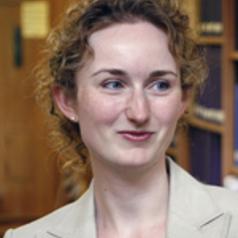
Emma Hitchings
Professor of Family Law, University of Bristol
Emma Hitchings is a Professor of Family Law at the University of Bristol Law School. She is an expert on financial remedies on divorce and family justice issues, and has been the lead or joint investigator on a range of empirical studies in family law and family justice, including Financial settlements following divorce (Nuffield); Pre-nuptial agreements (Law Commission); Everyday financial remedy cases (Nuffield); Fee-charging McKenzie Friends (Bar Council) and Litigants in Person in private family law cases (Ministry of Justice). She has written widely on issues in family law. A key theme underpinning her research has been exploring how family law works in practice and its impact on individuals, professionals and the family justice system.
Less ![]()
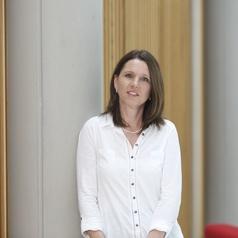
Emma Ireton
Associate Professor, Nottingham Law School, Nottingham Trent University
Prior to joining Nottingham Law School, Emma spent 12 years as a solicitor in commercial practice, in the fields of public inquiries, commercial litigation, and environmental law, including working on the Saville public inquiry into the events of Bloody Sunday.
Her research specialism is applied public inquiry law and procedure, particularly focusing on promoting greater public and academic understanding of the public inquiry process and improving public inquiry practice. She is a member of the NLS Research Centre for Conflict Rights and Justice.
Emma’s role includes curriculum development and course design for vocational and practitioner courses. Emma's focus is on bridging the gap between legal academia and practice. She works closely with leading solicitors, barristers and members of the judiciary to enhance curriculum design, write academic and practitioner publications, and on practice-focused research projects.
Less ![]()
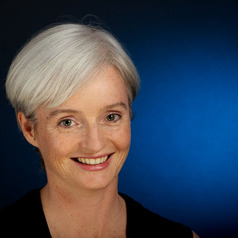
Emma Johnston
Professor and Pro Vice-Chancellor (Research), UNSW Australia
Professor & Pro Vice-Chancellor (Research) at the University of New South Wales.
Fields of Research: aquatic ecology, ecotoxicology, marine bioinvasions
Less ![]()
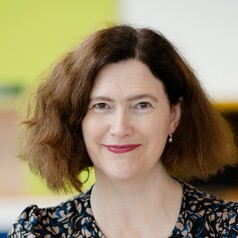
Emma Macdonald
Charles Huang Chair in International Business and Director, Stephen Young Institute, University of Strathclyde
Emma Macdonald is a professor at Strathclyde Business School where she is Charles Huang Chair in International Business and Director of the Stephen Young Institute.
Emma joined Strathclyde in 2023 as inaugural Director of the Stephen Young Institute which focuses on international and sustainable business. Emma was at Cranfield School of Management for a decade, holding a number of different roles including coDirector of the Cranfield Customer Management Forum for nine years and leader of Cranfield's popular Customer Centric Strategy programme for five years. Emma was Head of the Sustainability and Marketing faculty groups when she left Cranfield to join University of Warwick. As Professor of Marketing at Warwick Business School for four years, Emma led on the prestigious London MBA receiving multiple teaching commendations and an award for pastoral care.
Emma has consulted to organisations across the globe in business and nonprofit sectors, in product and service industries, and in business-to-consumer, business-to-business and government sectors. She has launched and led open and custom executive programmes including on customer experience management and marketing planning. She is Visiting Professor in Cranfield’s Sustainable Business Group. Emma’s research in sustainability and marketing has been published in Harvard Business Review, and in top-ranked journals including Journal of Marketing, Journal of Product Innovation Management and Journal of Business Research.
Less ![]()
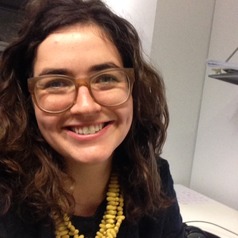
Emma McNicol
Research Fellow at Monash Sustainable Development Institute, Monash University
Dr Emma McNicol is a Research Fellow at Monash University's Sustainable Development Institute. Emma is an expert in feminist theory and has published widely on male violence, intersectionality and Simone de Beauvoir's work. Emma's current research project, National Indigenous Disaster Resilience, champions First Nations leadership in the face of natural hazards intensified by climate crisis.
Less ![]()

Emma Pakula
Senior Research and Policy Officer, Burnet Institute
A senior research and policy officer at The Burnet Institute in COVID-19 and health emergencies. She is experienced in program management and policy in public health, health system strengthening, emergency response and international development.
Less ![]()

Emma Palmer-Cooper
Lecturer in Psychology, Centre for Innovation in Mental Health, University of Southampton
Dr Emma Palmer-Cooper is a Lecturer in Psychology within the Centre for Innovation in Mental Health. My research primarily focuses on self-awareness in relation to mental health and related thought processes, psychological wellbeing, and creativity. I have a focus on developing digital interventions (eHealth) for mental health support, and understanding user attitudes towards AI.
I am also interested in Public Engagement, involving patients and the public in the design and communication of psychological and healthcare research.
Less ![]()

Emma Power
Associate Professor Emma Power is a speech pathologist and academic at the University of Technology Sydney. She has worked in the area of communication disorders following acquired brain injury for over 23 years in a variety of clinical and academic positions.
Less ![]()

Emma Rettner
PhD Candidate in Materials Science and Engineering, Colorado State University
Emma's research interests include polymer chemistry, block copolymer design and organic materials.
Less ![]()
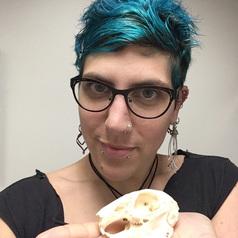
Emma Sherratt
Senior Research Fellow in Ecology & Evolutionary Biology, University of Adelaide
I am an evolutionary biologist, interested in understanding how the Earth's biodiversity came to be. In 2011, I completed a PhD at the Natural History Museum, London, on a group of cryptic amphibians called caecilians. They are limbless, head-first burrowing animals, and I used museum-based collections and cutting-edge imaging techniques to investigate how their skull evolved.
Since then I have held research appointments at institutions including Harvard University, Australian National University and University of Adelaide. I have studied a diversity of animals including rabbits, bivalved scallops, lizards, frogs and their tadpoles, and sea snakes. I am an expert in the statistical analysis of organismal form, a software creator, and a passionate educator.
Less ![]()

Emma Thomson
Clinical Professor of Infectious Diseases and Associate Director, MRC-Centre for Virus Research, University of Glasgow
I am an infectious diseases physician and researcher specialising in virus research. I have a strong interest in emerging viral infections in sub-Saharan Africa
Less ![]()
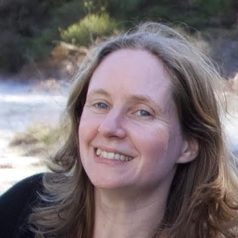
Emma Tomlinson
Associate Professor, Trinity College Dublin
MSci in Geology - University of Bristol, UK (2001)
PhD in Geochemistry - University College London, UR (2005)
Thesis title: The role of fluid in the growth of natural diamond
Less ![]()

Emma Turley
Senior Lecturer in Criminology, CQUniversity Australia
Dr Emma L Turley is a Senior Lecturer in Criminology and a Chartered Psychologist with the British Psychological Society. Emma is a critical psychologist and has a broad range of interdisciplinary research interests that span criminology and psychology. Her specialist areas of interest include gender, social justice, inequalities, LGBTQI+ issues, feminism, sexualities, and the digital world. She is also interested in qualitative research methods, especially phenomenology and experiential research, and the use of innovative data collection techniques.
Emma has published in the areas of sexualities, particularly marginalised sexual cultures, subculture, gendered violence, social media, gender inequalities, women’s wellbeing, and activism. Emma is a co-editor of the British Psychological Society's Psychology of Women & Equalities Review, and editorial advisory board member for British Mensa's Androgyny journal.
Less ![]()
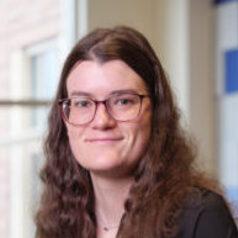
Emma Worden-Sapper
PhD Student in Molecular, Cellular and Developmental Biology, University of Colorado Boulder
Less ![]()

Emma A. Jane
Associate Professor, UNSW Sydney
Emma A. Jane - formerly published as Emma Tom - is an Associate Professor at UNSW Sydney. She researches the social implications of emerging technologies using complexity theory frameworks and transdisciplinary methods to interrogate the issues and consider proposed interventions. She has presented the findings of her research to the Australian Human Rights Commission, the Australian government's Workplace Gender Equality Agency, and the Festival of Dangerous Ideas at the Sydney Opera House. Prior to her career in academia, Dr Jane spent nearly 25 years working in the print, broadcast, and electronic media. Over the course of her working life, she has received multiple awards and prizes for her scholarly work, her journalism, and her fiction. Her 11th book, Diagnosis Normal, is a hybrid memoir published by Penguin Random House in 2022. In her spare time, she enjoys coding with AI and using OpenAI's DALL·E 2 to generate images of exuberant axolotls on their way to queer discos.
Less ![]()
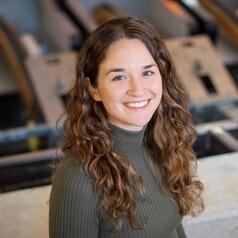
Emma C. Edwards
Career Development Fellow in Engineering, University of Oxford
Emma completed her BSc in mathematics at the University of North Carolina at Chapel Hill in 2012. She then worked as a research assistant for a year at the University of Edinburgh's Institute for Energy Systems, where she was introduced to wave energy. Emma completed her PhD at MIT in 2020, and her thesis, supervised by Professor Dick Yue, was titled ‘Optimization of the geometry of axisymmetric point absorber wave energy converters.’ She then held a part-time postdoctoral position at MIT with Professor Yue for a year.
She then completed a postdoctoral research fellowship from 2021-2023 at the University of Plymouth, working with Professor Deborah Greaves and Dr Martyn Hann, expanding her expertise to floating offshore wind turbines and physical modelling at one of the global hubs for offshore renewable energy research. From 2018-2022, in addition to her PhD and postdoctoral research, Emma competed as professional cyclist. In October 2023 she started as a Career Development Fellow in Engineering at St Peter's College, University of Oxford.
Her research focuses on fluid mechanics and its application to offshore renewable energy (ORE). Her main area of interest is around the hydrodynamics of wave-structure interaction, particular for floating bodies, and its impact on the performance of devices--principally floating offshore wind turbines and wave energy converters.
Less ![]()

Emma Forton Magavern
Clinical Research Fellow, Centre of Clinical Pharmacology and Precision Medicine, William Harvey Research Institute, Queen Mary University of London
Emma is a Medical doctor and a PhD candidate at the William Harvey Research Institute, QMUL, working with Professor Mark Caulfield. She completed a BA in English prior to her MD and subsequent MScs in Bioethics and Genomics. Through training in clinical medicine, humanities, genetics and pharmacology she has developed an interest in the scientific merits, clinical potential and implementation challenges of pharmacogenomics. She was co-secretary of the RCP/BPS working group on pharmacogenomics and led the ESC pharmacotherapy working group pharmacogenomics position paper.
Less ![]()
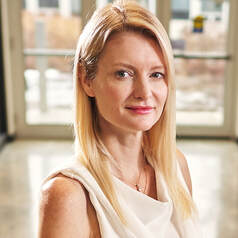
Emma G Duerden
Canada Research Chair, Neuroscience & Learning Disorders, Assistant Professor, Western University
Less ![]()
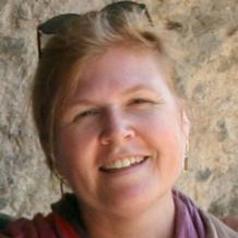
Emma Loosley Leeming
Professor of Middle Eastern and Caucasian Christianities, University of Exeter
Emma studied for a BA in History and History of Art at the University of York (1991-1994), where she specialised in the Medieval and Renaissance periods. She then worked back in time and took an MA (1994-1995) in Classical and Byzantine Art at the Courtauld Institute, University of London. It was during her MA that she discovered Late Antique Syria, which became the subject of her PhD thesis at the School of Oriental and African Studies (SOAS), University of London.
After graduating from SOAS in February 2001 she spent three years living and working as an archaeologist, fund-raiser, secretary and potato-peeler for the Community of Al-Khalil at Deir Mar Musa al-Habashi in Syria. The Community is dedicated to hospitality and Christian-Islamic dialogue and she spent the summers directing an archaeological excavation for the Community at their other monastery, Deir Mar Elian in Qaryatayn, and the rest of the year dealing with all English correspondence, greeting guests and helping with general chores (hence potato-peeling). During this period she was a visiting lecturer at SOAS and at the Université Saint Esprit de Kaslik in Lebanon. She also worked for the Abu Dhabi Ministry of Information as an archaeologist studying the artefacts found at a sixth-century monastery on the island of Sir Bani Yas.
In January 2004 she took up a position teaching Oriental Christian and Islamic Art at the University of Manchester and in 2010 she was appointed Senior Lecturer. During this time she was also a visiting lecturer at the Art University of Isfahan, Iran, the Ivane Javakhishvili Tbilisi State University, Georgia, the University of Tehran, the Teacher Training University of Tehran and the Amirkabir Polytechnic College, Tehran, Iran
She joined the University of Exeter in April 2013 and from 2012-2017 she worked on a five-year European Research Council funded project entitled Architecture and Asceticism: Cultural Interaction between Syria and Georgia in Late Antiquity exploring the purported Syrian evangelisation of Georgia in the fifth century and which sought to answer why the Georgians left the Oriental Orthodox fold to join with the Constantinopolitan Church in the early seventh century.
Since 2017 she has worked with the Georgian National Museum in Tbilisi on an initiative to widen participation in Heritage Education amongst children from ethnic, religious and linguistic minorities across Georgia.
Less ![]()

Emma Louise Gorman
Senior Research Fellow, University of Westminster
Emma is a Senior Research Fellow in the Centre for Employment Research, University of Westminster. As an applied economist, Emma’s research covers topics in education, labour economics and policy evaluation. Prior to joining the University of Westminster, she held appointments variously at Lancaster University, the University of Glasgow and the New Zealand Treasury, and has conducted research for the UK Department for Education, Social Mobility Commission and Department for Work and Pensions. Emma is a Fellow of the IZA (Institute of Labor Economics) and the GLO (Global Labor Organisation).
Less ![]()

Emmanuel Destenay
Research Fellow, Université Paris 1 Panthéon-Sorbonne
Emmanuel Destenay received his PhD from Sorbonne University. He has held research fellowships at Oxford University, Stanford University, and University College Dublin. His first monograph, Shadows from the Trenches: Veterans of the Great War and the Irish Revolution (1918–1923) received an honorable mention from the American Conference for Irish Studies. Divergent Destinies, his second book, reexamines the interconnection between fears of military service and the rise of Irish republicanism between 1914 and 1918. He is currently finishing a monograph on American humanitarian interventions in France during World War I. He is a research fellow at Sorbonne University.
Less ![]()
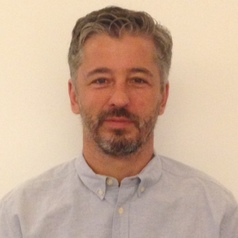
Emmanuel Josserand
Emmanuel Josserand is a Professor of management at the University of Technology, Sydney, where he is the Director of the Center of Management and Organisation Studies. His current research interests relate to inter- and intra-organizational networks and social capital, including global supply networks and to individual identity.
Less ![]()
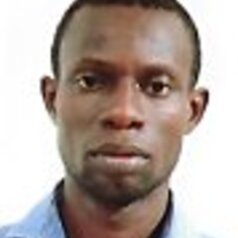
Emmanuel Oluwaseyi Atofarati
PhD Candidate, University of Pretoria
Publications:
Control of vortex shedding around a circular cylinder using bubble tabs in the laminar flow regime
EO Atofarati, AO Muritala, BO Malomo, SA Adio
Nigerian Journal of Technology 39 (4), 1108-1116 1, 2020
Assessing the factors affecting building construction collapse casualty using machine learning techniques: a case of Lagos, Nigeria
OO Awe, EO Atofarati, MO Adeyinka, AP Musa, EO Onasanya
International Journal of Construction Management, 1-9, 2023
The Evaluation of the Power Output of a Locally-Developed Micro Thermal Power Plant in Nigeria
A Morakinyo, EO Atofarati, A Asere
Ife Journal of Technology 28 (1), 18-27, 2021
Molecular Dynamics Simulation Research (From Atomic Fragments to Molecular Compounds)
EO Atofarati
Less ![]()
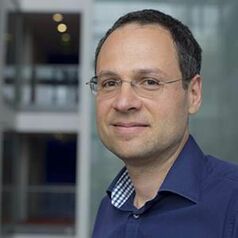
Emmanuel Pothos
Professor of Psychology, City, University of London
Emmanuel Pothos received a BSc in Physics from Imperial (1995) and DPhil in experimental psychology from Oxford (1998). At an undergraduate student at Imperial he received the Stainley Raimes Memorial Prize, for outstanding performance in first and second year mathematics. Emmanuel has worked at several universities, including Bangor University, Edinburgh University, Crete University, Swansea University, and, since 2009, City, University of London, where he has been a professor since 2014. He has been interested in several topics in cognitive science, including learning, categorization, similarity, language, and (more recently) decision making. He has been part of the quantum cognition research community from the very early days and has contributed some of the early models, for example, concerning the disjunction effect and the conjunction fallacy. He has co-authored two major reviews of the quantum cognition research programme, for the Behavioral and Brain Sciences (2013) and the Annual Review of Psychology (2022). He continues to actively develop quantum cognitive models and explore the potential and boundaries of quantum theory for behavioural modelling. He has 120 journal articles has his work has been funded by several organisations, including the ESRC, the AFOSR, the ONRG, and the Leverhulme Trust.
Less ![]()

Emmanuel Urquieta
Professor of Space Medicine and Emergency Medicine, Baylor College of Medicine
Emmanuel Urquieta holds a medical degree from Anahuac University in Mexico City and a master of science in aerospace medicine from Wright State University in Dayton, Ohio.
Emmanuel completed a diploma in emergency medicine and then worked for Mexico City’s Department of Public Safety as a flight surgeon in the Helicopter Emergency Medical Service "Condors" where he participated in hundreds of rescue missions and aeromedical evacuation within the Mexico City metropolitan area. He holds a private pilot certificate and an open water scuba diver certificate.
He has volunteered in medical missions in underserved regions throughout Mexico and in Nigeria, Africa. He was a volunteer paramedic for the Mexican Red Cross for more than 5 years.
Emmanuel has participated as a crew member of an analog mission at NASA Johnson Space Center: in 2017 he was selected to participate in the Human Exploration Research Analog (HERA) XI mission where he spent 30 days in a capsule simulating a deep space long duration mission. This mission aimed to understand the behavioral and physiological effects from isolation and confinement.
He currently serves as scientist at the NASA funded Translational Research Institute for Space Health, where he manages different research projects in different areas going from radiation protection to psychological changes during deep spaceflight.
Dr. Urquieta has a dual faculty appointment as an Assistant Professor in the Department of Emergency Medicine and Center for Space Medicine at Baylor College of Medicine. He is also a FAA private pilot and scuba diver.
During his free time he likes to design LEGO rocket ship models and spend time with his wife and daughters.
Less ![]()
- Market Data




















